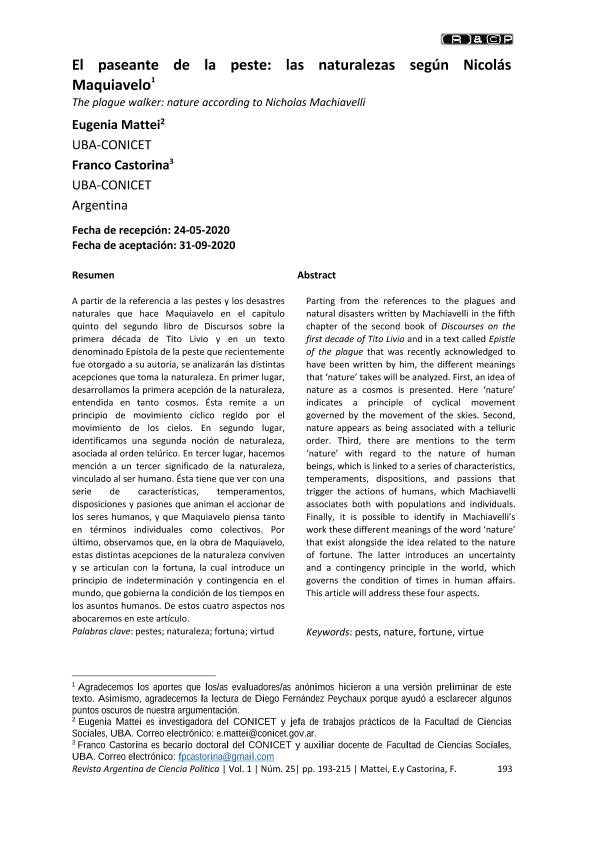Mostrar el registro sencillo del ítem
dc.contributor.author
Castorina, Franco Patricio

dc.contributor.author
Mattei, Eugenia

dc.date.available
2022-10-06T13:31:13Z
dc.date.issued
2020-12
dc.identifier.citation
Castorina, Franco Patricio; Mattei, Eugenia; El paseante de la peste: Las naturalezas según Nicolás Maquiavelo; Universidad de Buenos Aires. Facultad de Ciencias Sociales. Instituto de Investigaciones Gino Germani; Revista Argentina de Ciencia Política; 1; 25; 12-2020; 193-215
dc.identifier.issn
0329-3092
dc.identifier.uri
http://hdl.handle.net/11336/172192
dc.description.abstract
A partir de la referencia a las pestes y los desastres naturales que hace Maquiavelo en el capítulo quinto del segundo libro de Discursos sobre la primera década de Tito Livio y en un texto denominado Epístola de la peste que recientemente fue otorgado a su autoría, se analizarán las distintas acepciones que toma la naturaleza. En primer lugar, desarrollamos la primera acepción de la naturaleza, entendida en tanto cosmos. Ésta remite a un principio de movimiento cíclico regido por el movimiento de los cielos. En segundo lugar, identificamos una segunda noción de naturaleza, asociada al orden telúrico. En tercer lugar, hacemos mención a un tercer significado de la naturaleza, vinculado al ser humano. Ésta tiene que ver con una serie de características, temperamentos, disposiciones y pasiones que animan el accionar de los seres humanos, y que Maquiavelo piensa tanto en términos individuales como colectivos. Por último, observamos que, en la obra de Maquiavelo, estas distintas acepciones de la naturaleza conviven y se articulan con la fortuna, la cual introduce un principio de indeterminación y contingencia en el mundo, que gobierna la condición de los tiempos en los asuntos humanos. De estos cuatro aspectos nos abocaremos en este artículo.
dc.description.abstract
Parting from the references to the plagues and natural disasters written by Machiavelli in the fifth chapter of the second book of Discourses on the first decade of Tito Livio and in a text called Epistle of the plague that was recently acknowledged to have been written by him, the different meanings that ‘nature’ takes will be analyzed. First, an idea of nature as a cosmos is presented. Here ‘nature’ indicates a principle of cyclical movement governed by the movement of the skies. Second, nature appears as being associated with a telluric order. Third, there are mentions to the term ‘nature’ with regard to the nature of human beings, which is linked to a series of characteristics, temperaments, dispositions, and passions that trigger the actions of humans, which Machiavelli associates both with populations and individuals. Finally, it is possible to identify in Machiavelli’s work these different meanings of the word ‘nature’ that exist alongside the idea related to the nature of fortune. The latter introduces an uncertainty and a contingency principle in the world, which governs the condition of times in human affairs. This article will address these four aspects.
dc.format
application/pdf
dc.language.iso
spa
dc.publisher
Universidad de Buenos Aires. Facultad de Ciencias Sociales. Instituto de Investigaciones Gino Germani

dc.rights
info:eu-repo/semantics/openAccess
dc.rights.uri
https://creativecommons.org/licenses/by-nc-sa/2.5/ar/
dc.subject
Pestes
dc.subject
Naturaleza
dc.subject
Fortuna
dc.subject
Virtud
dc.subject.classification
Otras Ciencia Política

dc.subject.classification
Ciencia Política

dc.subject.classification
CIENCIAS SOCIALES

dc.title
El paseante de la peste: Las naturalezas según Nicolás Maquiavelo
dc.title
The plague walker: Nature according to Nicholas Machiavelli
dc.type
info:eu-repo/semantics/article
dc.type
info:ar-repo/semantics/artículo
dc.type
info:eu-repo/semantics/publishedVersion
dc.date.updated
2022-10-03T17:58:29Z
dc.identifier.eissn
2683-9032
dc.journal.volume
1
dc.journal.number
25
dc.journal.pagination
193-215
dc.journal.pais
Argentina

dc.journal.ciudad
Ciudad Autónoma de Buenos Aires
dc.description.fil
Fil: Castorina, Franco Patricio. Consejo Nacional de Investigaciones Científicas y Técnicas; Argentina. Universidad de Buenos Aires. Facultad de Ciencias Sociales. Instituto de Investigaciones "Gino Germani"; Argentina
dc.description.fil
Fil: Mattei, Eugenia. Consejo Nacional de Investigaciones Científicas y Técnicas; Argentina. Universidad de Buenos Aires. Facultad de Ciencias Sociales. Instituto de Investigaciones "Gino Germani"; Argentina
dc.journal.title
Revista Argentina de Ciencia Política

dc.relation.alternativeid
info:eu-repo/semantics/altIdentifier/url/https://publicaciones.sociales.uba.ar/index.php/revistaargentinacienciapolitica/article/view/6145
Archivos asociados
